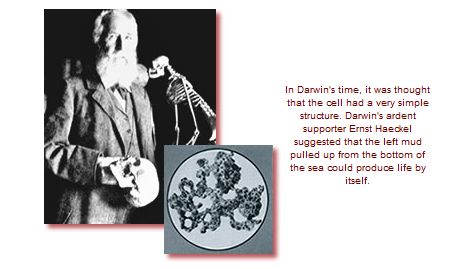The complex structure of the living cell was unknown in Darwin's day and at the time, ascribing life to "coincidences and natural conditions" was thought by evolutionists to be convincing enough. Darwin had proposed that the first cell could easily have formed "in some warm little pond."238 One of Darwin's supporters, the German biologist Ernst Haeckel, examined under the microscope a mixture of mud removed from the sea bed by a research ship and claimed that this was a nonliving substance that turned into a living one. This so-called "mud that comes to life," known as Bathybius haeckelii ("Haeckel's mud from the depths"), is an indication of just how simple a thing life was thought to be by the founders of the theory of evolution.
The technology of the twentieth century has delved into the tiniest particles of life, and has revealed that the cell is the most complex system mankind has ever confronted. Today we know that the cell contains power stations producing the energy to be used by the cell, factories manufacturing the enzymes and hormones essential for life, a databank where all the necessary information about all products to be produced is recorded, complex transportation systems and pipelines for carrying raw materials and products from one place to another, advanced laboratories and refineries for breaking down external raw materials into their useable parts, and specialized cell membrane proteins to control the incoming and outgoing materials. And these constitute only a small part of this incredibly complex system.
W. H. Thorpe, an evolutionist scientist, acknowledges that "The most elementary type of cell constitutes a 'mechanism' unimaginably more complex than any machine yet thought up, let alone constructed, by man."239
A cell is so complex that even the high level of technology attained today cannot produce one. No effort to create an artificial cell has ever met with success. Indeed, all attempts to do so have been abandoned.
The theory of evolution claims that this system-which mankind, with all the intelligence, knowledge and technology at its disposal, cannot succeed in reproducing-came into existence "by chance" under the conditions of the primordial earth. Actually, the probability of forming a cell by chance is about the same as that of producing a perfect copy of a book following an explosion in a printing house.
The English mathematician and astronomer Sir Fred Hoyle made a similar comparison in an interview published in Nature magazine on November 12, 1981. Although an evolutionist himself, Hoyle stated that the chance that higher life forms might have emerged in this way is comparable to the chance that a tornado sweeping through a junk-yard might assemble a Boeing 747 from the materials therein.240 This means that it is not possible for the cell to have come into being by chance, and therefore it must definitely have been "created."
One of the basic reasons why the theory of evolution cannot explain how the cell came into existence is the "irreducible complexity" in it. A living cell maintains itself with the harmonious co-operation of many organelles. If only one of these organelles fails to function, the cell cannot remain alive. The cell does not have the chance to wait for unconscious mechanisms like natural selection or mutation to permit it to develop. Thus, the first cell on earth was necessarily a complete cell possessing all the required organelles and functions, and this definitely means that this cell had to have been created.
238 Charles Darwin, Life and Letter of Charles Darwin, vol. II, From Charles Darwin to J. Do Hooker, March 29, 1863
239 W. R. Bird, The Origin of Species Revisited, Thomas Nelson Co., Nashville, 1991, pp. 298-99.
240 "Hoyle on Evolution," Nature, vol. 294, November 12, 1981, p. 105.
239 W. R. Bird, The Origin of Species Revisited, Thomas Nelson Co., Nashville, 1991, pp. 298-99.
240 "Hoyle on Evolution," Nature, vol. 294, November 12, 1981, p. 105.



No comments:
Post a Comment